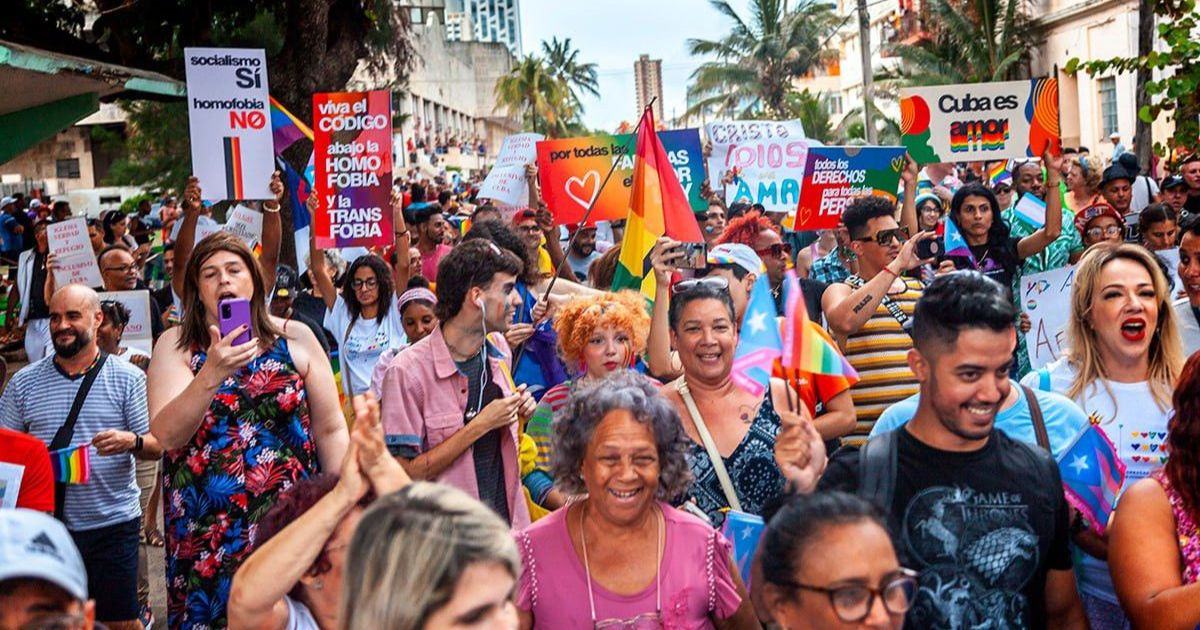The National Center for Sexual Education (CENESEX) excitedly announced on Wednesday the return of the Cuban Conga against Homophobia and Transphobia. This event stands as a significant representation of the LGBTIQ+ rights movement in Cuba. According to the institution's official Facebook page, the conga is set for this Saturday, beginning at 6:00 p.m. at Calzada and Paseo, near the Hotel Cohiba, and ending at Calle 12, in front of Club 500, right in the heart of Havana's Vedado district.
This invitation encourages the public to participate in this vibrant space of visibility, diversity, and celebration, which is part of the annual Cuban Days against Homophobia and Transphobia, organized by CENESEX. With a communal and festive atmosphere, CENESEX urged participation with the call: “Get ready and join the Cuban Conga against Homophobia and Transphobia!” This message was accompanied by hashtags such as #Cenesex, #TodosLosDerechosParaTodasLasPersonas, and #PorTodasLasFamiliasElAmorEsLey, used on social media to boost the campaign's reach.
Controversy and Political Overtones
Despite being presented as a platform for popular expression, music, and rights advocacy, the CENESEX-organized conga has been criticized by some as aligning with the Cuban regime. While the majority of social media comments supported the event, there were dissenting voices. User Valdés Yoki Joel Delgado questioned the event's name, stating, “They still call it Conga, with the surname against homophobia and transphobia... when will it be recognized as Gay Pride Day? I know, never, because despite the supposed openness with international eyes on marriage, there are still many remnants of machismo and intolerance towards this LGBT community.”
Official Participation and Criticism
In past editions, even official figures like Lis Cuesta, the wife of Cuban leader Miguel Díaz-Canel, participated. However, for many in the LGBTIQ+ community, it remains a rare opportunity for public visibility in a country with limited freedom of expression. The 2023 edition saw CENESEX director Mariela Castro Espín and Lis Cuesta Peraza leading the conga in Havana, as part of official celebrations promoted by the regime. The event also featured Communist Party officials, government representatives, and health ministry officials, which critics argue highlights the contradiction of those historically repressing the LGBTIQ+ community now promoting inclusive spaces without real reparations for past abuses.
Past Clashes and Repression
In stark contrast, the official response in 2019 to an independently organized peaceful march by the LGBTI+ community was drastically different. Activists called for an alternative march following the cancellation of the official conga, and the Cuban State security and police reacted with arbitrary detentions and force against those attempting to walk along Havana's Paseo del Prado. Images of the violent arrests spread widely on social media, drawing international condemnation. Among those detained was biologist Ariel Ruiz Urquiola, who was beaten and subdued by police agents, underscoring the systematic repression against autonomous dissent, even in matters related to human rights and diversity.
Suspension in 2022
In 2022, the conga was canceled to honor the families of the victims of the Saratoga hotel explosion. In this context, all festive activities planned as part of the Cuban Day against Homophobia and Transphobia, including the “Conga for Diversity,” were called off.
FAQs About the Cuban Conga Against Homophobia and Transphobia
What is the purpose of the Cuban Conga against Homophobia and Transphobia?
The Cuban Conga against Homophobia and Transphobia aims to raise awareness and promote visibility for LGBTIQ+ rights, offering a platform for expression and celebration within the community.
Who organizes the Cuban Conga against Homophobia and Transphobia?
The event is organized by the National Center for Sexual Education (CENESEX), a Cuban institution dedicated to promoting sexual education and rights.
Why has the conga been criticized?
Critics argue that the conga aligns with the Cuban regime and lacks genuine reparations for past abuses against the LGBTIQ+ community, pointing out inconsistencies in Cuba's approach to human rights.
